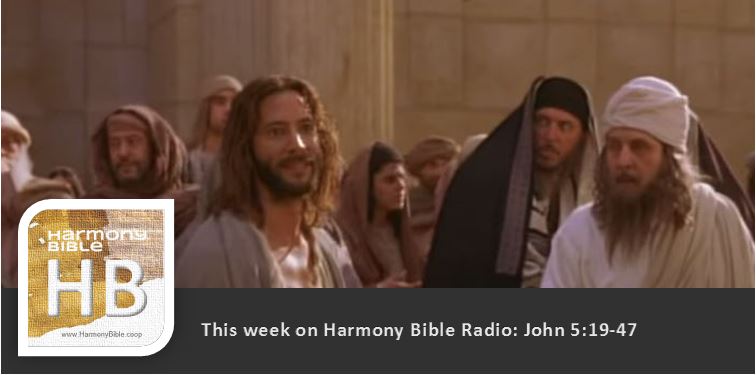Week 37 | Section 50 | Phase 4
Summary: On the way from Jerusalem to Galilee, a few Pharisees scrutinize Jesus’ disciples for gathering a bit of grain from a roadside field to quiet their stomachs. Jesus’ response is no easier for them to stomach and His final words were as meaty as the grains themselves.
Harmony Bible Radio Archive: https://soundcloud.com/gtroxell/sets/harmony-bible
Today’s Gospel Reading
| Matthew 12:1-8 | Mark 2: 23-28 | Luke 6:1-5 | John |
| 1 At that time, Jesus went on the Sabbath[i] day through the grain fields. His disciples were hungry and began to pluck heads of grain and to eat[ii]. 2 But the Pharisees, when they saw it, said to him, “Behold, your disciples do what is not lawful to do on the Sabbath[iii].” 3But he said to them, “Haven’t you read what David did[iv], when he was hungry, and those who were with him; 4 how he entered into God’s house, and ate the show bread, which was not lawful for him to eat, neither for those who were with him, but only for the priests? 5 Or have you not read in the law, that on the Sabbath day, the priests in the temple profane the Sabbath[v], and are guiltless? 6 But I tell you that one greater than the temple is here[vi]. 7 But if you had known what this means, ‘I desire mercy, and not sacrifice,’[vii] you wouldn’t have condemned the guiltless. 8 For the Son of Man is Lord of the Sabbath.”[viii] |
23 He was going on the Sabbath day through the grain fields, and his disciples began, as they went, to pluck the ears of grain. 24 The Pharisees said to him, “Behold, why do they do that which is not lawful on the Sabbath day?”
25He said to them, “Did you never read what David did, when he had need, and was hungry—he, and those who were with him? 26 How he entered into God’s house at the time of Abiathar the high priest, and ate the show bread, which is not lawful to eat except for the priests, and gave also to those who were with him?” 27 He said to them, “The Sabbath was made for man, not man for the Sabbath. 28 Therefore the Son of Man is lord even of the Sabbath.” |
1 Now on the second Sabbath after the first, he was going through the grain fields. His disciples plucked the heads of grain and ate, rubbing them in their hands.2 But some of the Pharisees said to them, “Why do you do that which is not lawful to do on the Sabbath day?”
3 Jesus, answering them, said, “Haven’t you read what David did when he was hungry, he, and those who were with him; 4 how he entered into God’s house, and took and ate the show bread, and gave also to those who were with him, which is not lawful to eat except for the priests alone?” 5 He said to them, “The Son of Man is lord of the Sabbath.” |
No record provided |
The World English Bible (WEB) is a Public Domain (no copyright) Modern English translation of the Holy Bible. That means that you may freely copy it in any form, including electronic and print formats. The World English Bible is based on the American Standard Version
Media:
Small group dialog:
- Why might the Pharisees have been so upset with Jesus? What happened before this event (review Sec 49a,b,c)?
- What customs do you (or others) have that prove have helpful to your own salvation and vitality of faith, but might actually prove to be a hindrance or unnecessary discipline for another?
- In Matthew 12:7 Jesus quotes a third Old Testament passage (Hos 6:6). In what way would/has your own life, character, behavior and attitude be changed by taking this verse to heart?
- What does it mean for Jesus to be “Lord of the Sabbath” and “Son of Man”? Is it imperative to Christians today or are these terms irrelevant today? What is your own conviction about these two claims which Jesus himself boldly professed?
Study Notes and Cross-References:
[i] This would be the Sabbath after the Passover. See Luke 6:1 that is the second Sabbath after the Feast of Unleavened Bread as the “first Sabbath” fell during the actual week of the Passover feast. There are laws and customs on the Sabbath but paramount is only this, “Remember the Sabbath and keep it Holy” (Exodus 20:8). The word holy means “to sanctify, to separate from the world and to consecrate or dedicate to God.” To be “holy” is to be separate from the world and to be dedicated to God. You might like to read this article, and also these passages: Dt 5:12-14; Exodus 31:13-17; Ezekiel 20:12,20.
[ii] It was lawful to pick grain from another’s field if hungry, however one could not fill their jar or basket – just enough to quell the hunger (Dt. 23:25). Edersheim reveals a passage from the Talmud (Jer. Shabat 10a) that indicates that picking, rubbing and eating of the grain would have been seen as three distinct sins according to Pharisaic interpretation of what God meant when He said keep the Sabbath holy. Note: that while some translations say corn, others say wheat or barley. The agricultural record would lead us to believe that it was barely, but the Levitical law would lead us to say it was wheat (Lev. 23:10) – but it really doesn’t matter – it was grain and Jesus makes point to clarify that they had not sinned.
[iii] The issue here was not picking grain but that it was a Sabbath. Mishna Shabat 7.2 states that there are 39 different categories of work prohibited on Shabat. Jesus however overrides this law claiming himself to be “Lord of the Sabbath” See also Section 49b (Specifically John 5:17) which precedes this passage by just a few days.
[iv] 1 Samuel 21:1-6 – This would have been the tabernacle as the temple was not yet built (Ex 26). You might also notice that it was Ahimelech, who served as High Priest, and allowed David to eat the consecrated bread (I Samuel 21:1-9). However, it was also during the days of Abiathar as he succeeded his father (I Samuel 22:9-20; 30:7). The event with the showbread occurred during the life of Abiathar who was a High Priest — it just didn’t happen while he was High Priest. Therefore it would have been acceptable for Jesus to mention either Abiathar or Ahimalech. See also Ex 25:30; Lev 24:5-9
[v] Just as it is today, the Sabbath was the busiest day in the week for the priests. Services and sacrifices involved all sorts of preparation: from baking the showbread; trimming wicks, sacrifices (Numbers 28:9) (killing, skinning, and cleaning of the animals, as well as building a fire). The priests were not actually sinning or profaning the Sabbath but Jesus was using the parallel to help the Pharisees gain better perspective that some work was acceptable for those doing God’s work – even on the Sabbath. Let’s remember that these customs (laws) to which they were they were referring were not the Ten Commandments, but priests refinements of them in an effort to help people remain holy, set apart, and ready to do the work of God. The fourth commandment did not forbid work on the Sabbath, but “labor for worldly gain”.
[vi] He is here continuing to compare the service within the temple and the service of his disciples to himself, alluding but for a moment to his divinity until his closing line in verse Mt 12:8; Mk 8:28; Luke 6:5.
[vii] One again Jesus quotes Hosea 6:6. Here is one of the primary spiritual lessons Jesus chose to deliver to the Pharisees and us today. The meaning is that the inward life/condition is over/supersedes the outward form. If the heart attitude or condition is wrong/sinful then outward appearance and action is far less significant/important. David said something similar in Psalm 51:16-17 and the Apostle Paul spoke of the same meaning in 1 Corinthians 13:3.
[viii] To claim himself to be “Lord of the Sabbath” and “Son of Man” (Mt 12:8; Mk 8:28; Luke 6:5) is a claim to his divinity, equality with God and role as Messiah (Dan 7:13).

